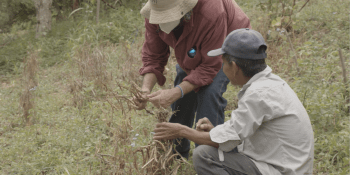Lower emissions in Latin American agriculture: can we reach that goal?

Where: Tune in on the day here.
We recently expanded our activities into Latin America, with the goal of reaching six million farmers to help them adapt to and mitigate climate change in a sustainable way. A key strategy to do this is to help Latin America countries plan and implement climate-smart agriculture policies.
But how can policy makers know how to assess what technologies and options will foster food security in a changing climate while reducing emissions?
To help start the dialogue, the CGIAR Research Program on Climate Change, Agriculture and Food Security (CCAFS) is collaborating with the Finanzas Carbono Plattform, the Regional Gateway for Technology Transfer and Climate Change Action in Latin America and the Caribbean (REGATTA) from the United Nations Environment Programme (UNEP), and the Consejo Agropecuario Centroamericano (CAC) to host a series of webinars focused on mitigation of greenhouse gases in agriculture in the Latin American region.
The first webinar on 17 September, focused on synergies between climate change adaptation and mitigation in agriculture. Laura Meza, Senior Consultant on Climate Change and Disaster Risk Management at FAO, introduced the concept of climate smart agriculture and how development strategies, policies, and investments can support it.
According to Meza, “There is substantial overlap between sustainable land management practices that can increase capacity for adaptation and allow the mitigation of greenhouse gases.” Measures support these practices could range from stronger enforcement of deforestation laws to investments in agricultural value chains to reduce waste of food, energy, and water.
Following Laura’s presentation, Peter Läderach, CCAFS Researcher, presented findings on adaptation-mitigation synergies in coffee production. Coffee is a crop of major importance to many Latin American farmers, and also a crop with particular vulnerability to climate change, as its productivity and quality is highly sensitive to climate.
By analyzing 12 agricultural practices in partnership with coffee farmers in Northern Nicaragua, Läderach and his colleagues were able to “see what practices contribute to ‘triple-wins’ for adaptation, mitigation, and livelihoods.”
Learn more: Are there synergies between climate change adaptation and mitigation in coffee production?
Afforestation of degraded lands, installing biodigesters for wastewater treatment, and improving slash-and-burn systems for food crops all showed high potential for triple-wins in the coffee sector.
The approach used by Läderach and his colleagues could provide a starting point for assessing synergies in for other types of smallholder farmers, as it allowed for a “holistic assessment” of the adaptation needs of the farmers.
Stay tuned for the next joint webinar on November 12, at 13:00 CET [convert to your time zone] which will focus on tools for quantifying greenhouse gas emissions in agricultural systems.
Mariana Rufino of the Center for International Forestry Research (CIFOR) will discuss the Standard Assessment of Mitigation Potential and Livelihoods in Smallholder Systems (SAMPLES) project. SAMPLES is a joint project between CCAFS and several CGIAR centers to help identify mitigation options in the agricultural sector.
Following Mariana's introduction, Aracely Castro of the International Center for Tropical Agriculture (CIAT) will give a sneak peek of CIAT's plans for SAMPLES in Latin America, which include assessing the potential of improved crop and livestock systems to provide benefits to farmers while reducing greenhouse gas emissions.
The methods and data currently being developed by SAMPLES will provide information for identifying mitigation options in agricultural landscapes that make economic sense for farmers. Furthermore, the ability to monitor and report emissions reductions is critical to accessing funding for low emissions development. SAMPLES activities in the region will contribute critical data to estimate emissions in key agricultural sectors in the region, such as livestock.
Meryl Richards works as Science Officer with the Low-Emissions Agriculture theme.



